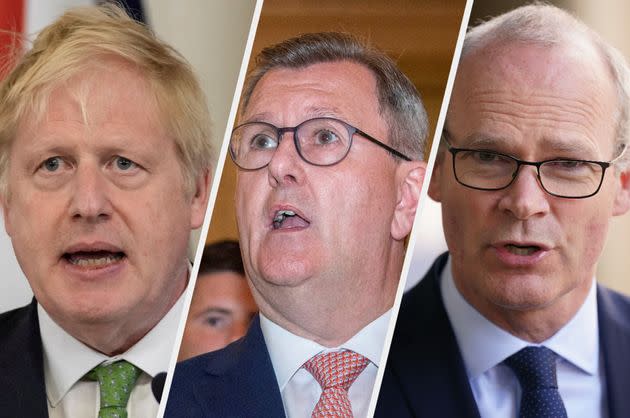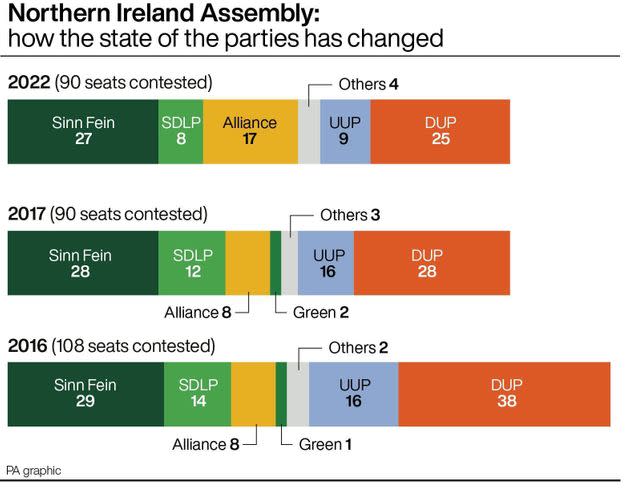Northern Ireland Protocol: Everything You Need To Know As UK And EU Lock Horns Again

PM Boris Johnson, DUP's Jeffrey Donaldson and Ireland's foreign minister Simon Coveney (Photo: Getty)
The UK and the EU are once again at loggerheads over the Northern Ireland Protocol, with this week set to be a particularly tense one.
Boris Johnson headed to Belfast on Monday morning to try and thrash out a solution with local parties, but as Brussels digs its heels in, it’s not clear if a clean resolution is possible.
With worries over a possible trade war and further potential divisions in Northern Ireland, here’s everything you need to know about the post-Brexit EU-UK agreement which has come back to haunt politics.
What is the Northern Ireland protocol?
Back in 2019 when the UK was trying to negotiate the terms of its post-Brexit relationship with the EU, no-one could agree on what to do about Northern Ireland.
It is the only part of the UK with an EU border, as it neighbours the Republic of Ireland. The bloc has strict trade rules and, as the UK was going to be treated as a third non-EU country after Brexit, any goods coming from it and going into the bloc need to be checked.
Both sides were also keen to honour the 1998 Good Friday agreement by avoid putting up a hard border between Northern Ireland and the Republic.
Johnson subsequently put forward the Northern Ireland Protocol where there would essentially be a trade border down the Irish Sea - something he had previously insisted would not happen.
Goods could pass over the Irish border easily, because Northern Ireland would continue to follow the EU’s trade rules – despite leaving the EU along with the rest of the UK.
But, goods coming from Britain and entering Northern Ireland would have to be checked.

Boris Johnson discussed the Northern Ireland Protocol with then Irish Taoiseach Leo Varadkar back in 2019. (Photo: Charles McQuillan via Getty Images)
So, what’s gone wrong?
Unionists have argued from the beginning that the protocol would split Northern Ireland from the rest of the UK, cause huge trade delays and food shortages.
The Democratic Unionists, (DUP), the largest unionist party, have insisted the Protocol must be redrawn to prevent Northern Ireland being treated differently from the rest of the UK.
They have said that until this is done, they will not enter into a power-sharing government at Stormont with Sinn Fein, which gained the largest number of seats at the recent Northern Ireland election and supports the Protocol.
It is also worth noting that the Protocol has not even been fully implemented yet. As we are still in the grace period of the initial agreement, more restrictions are expected to be introduced in the months ahead unless it is substantially altered.

The DUP secured 25 seats this year in the Northern Ireland Assembly, making it the second largest party (Photo: PA Graphics)
Does Downing Street agree with the DUP?
Even though Johnson signed up to the Protocol as part of the withdrawal agreement struck when the UK left the EU, he has now sided with the unionists and insisted it must be changed.
He pointed out in his piece in the Belfast Telegraph on Sunday, “there is no disguising the fact that the delicate balance created in 1998 has been upset”.
He added that the unionists of Northern Ireland feels their identity to being threatened by the current arrangement.
“We cannot allow the impression that one strand is deemed more important than others; or that EU custom codes – designed for vast container ships coming from Shanghai to Rotterdam, not supermarket lorries from Liverpool to Belfast – somehow trump everything else,” the prime minister explained.
He also noted that medical testing and medicine access in Northern Ireland is a particular cause for concern in the post-Covid era.
Northern Ireland is not part of the same tax and VAT arrangements as the rest of the UK either, so the country is not receiving the same help from central government as the rest of the UK, according to the prime minister.
Johnson then took aim at the EU over the challenges, saying: “We have been told by the EU that it is impossible to make the changes to the Protocol text to actually solve these problems in negotiations — because there is no mandate to do so.”
However, he has been heavily criticised for blaming others when he did actually agree to the Protocol himself.
Sam McBride( Belfast Telegraph & Sunday Independent) - "Boris Johnson said the protocol is a great deal for NI... & now he's saying it's a fundamentally flawed deal, but he's not pointing the blame at himself, it's all the fault of other people.. " pic.twitter.com/S6bjtUTyvv
— Haggis_UK 🇬🇧 🇪🇺 (@Haggis_UK) May 16, 2022
How does the UK want to resolve it?
The UK wants to get rid of checks and paperwork between Britain and Northern Ireland.
Downing Street also wants to ensure British goods which do not then travel outside of the Northern Ireland only need to meet British standards, as well as removing the European Commission and European Court of Justice’s authority over the protocol.
Johnson has called for general willingness from the EU to help, pointing out: “We must remember that all parties to the Protocol made a commitment to be willing to revisit, adapt and change these arrangements over time — and to protect the internal market of the UK.”
But, the prime minister has also warned that if the EU does not change its position, “there will be necessity to act”.
What does the EU think?
In short – it doesn’t really want to change anything.
It has refused to renegotiate the contents of the protocol, and wants extra safeguarding for things going into the Republic.
The EU has also claimed that the UK has breached international law by delaying the moment when the protocol comes into full force.
Spoke to @MarosSefcovic this evening. We are in agreement on U.K. Government threats of unilateral action & breach of Int. law.
The way forward is partnership, dialogue & genuine negotiation, not threats and raising tension. Solutions exist, let’s work them out together! 🇪🇺🇬🇧 https://t.co/XCTN3oWHQm— Simon Coveney (@simoncoveney) May 12, 2022
Ireland’s foreign minister Simon Coveney said: “My message to the British government is crystal clear — to act unilaterally to break international law, to not respect the democratic decisions in Northern Ireland would make matters significantly worse not better in terms of trying to solve the problems of the protocol.”
He added that the UK is in for a “very difficult summer” if it overrides the protocol.
But, he also told POLITICO that the EU is prepared to move on the unionists’ main demand, reducing checks on goods coming into Northern Ireland from Britain.
The EU also wants the UK to share more data on the goods coming from Britain, along with an 80% reduction in checks on food products arriving in Northern Ireland.
It has suggested halving the paperwork, reducing the customs informations firms need to provide, allowing trade in medicine between Britain and Northern Ireland to continue and relaxing rules so chilled meats can be sent across the Irish Sea.
But, the UK said these suggestions only “worsen the current trading arrangements”.
Why is this week set to be particularly important?
Downing Street will outline a more detailed assessment on what will happen with the Protocol “in the coming days”, once the prime minister has discussed the situation with local parties.
Coveney will meet European Commission vice president Maroš Šefčovič too, this week and speak to foreign secretary Liz Truss.
Truss will announce a new law to override parts of the protocol on Tuesday – a move which will undoubtedly spark a fierce response from Brussels.
The government has repeatedly said “no option is off the table” and even threatened to trigger Article 16, an element of the original deal which allows either side to completely suspend the agreement.
Yet this could trigger EU retaliation and a trade war.
Former prime minister Theresa May also warned that this could damage the UK’s reputation telling her colleagues in the Commons: “What such a move would say about the UK and its willingness to abide by treaties which it has signed.”
“Sadly the DUP and others chose to reject that.”
Former PM Theresa May tells DUP leader Jeffrey Donaldson her #Brexit deal protected the Good Friday Agreement and would have prevented a border in the Irish Sea or on island of Ireland.pic.twitter.com/glHgHgtI7K— Darran Marshall (@DarranMarshall) May 10, 2022
Should we be worried about the rising tensions?
Protests in Northern Ireland have been increasing since 2021, along with sporadic street violence.
Europe minister James Cleverly told the Commons European Scrutiny Committee at the end of April: “Everyone in government is really focused on making sure we don’t see Northern Ireland slip back into violence at all.
“We feel that this is one of the things we should address to prevent that happening.”
It also looks unlikely that a trade war will kick off any time soon.
Truss’ potential announcement about taking on the protocol would take weeks before it passed into law, which allows for some much needed negotiation time.
Ireland’s Coveney also said: “The last thing the EU needs or wants right now is tension with the UK, but if the British government decides to move forward with unilateral action which will not reflect the majority view in Northern Ireland, that will of course be a huge problem for the EU.”
The US is also looking for “this to be resolved without any theatre around it”, according to Conor Burns, the PM’s Northern Ireland envoy to the States.
This article originally appeared on HuffPost UK and has been updated.

 Yahoo Movies
Yahoo Movies 